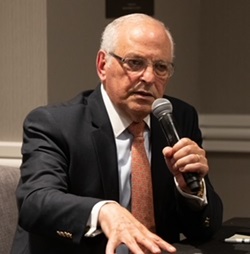10/06/2024
Advisor to Former PM Says Two-State Solution 'Only Way' To Go
ABIGAIL PREISZIG | CJN
Article reprinted with permission from Cleveland Jewish News

Novik
A two-state solution is the “only way for Israel to have security and the Palestinians to have dignity,” Nimrod Novik, the former senior adviser on foreign policy to the late Israeli Prime Minister Shimon Peres, told the Cleveland Jewish News in an interview on Sept. 17 at the Jewish Federation of Cleveland’s office in the Jack, Joseph and Morton Mandel Building in Beachwood.
Novik is a member of Commanders for Israel’s Security, a nonpartisan movement of over 500 retired Israel Defense Forces generals and their equivalents in the Shin Bet, Mossad, Israel Police and diplomatic corps. dedicated to “a strong Jewish democratic Israel for decades to come,” he said.
“We believe that in order to be strong and Jewish and democratic, we have to separate from the Palestinians,” Novik said, adding that a one-state reality is “ever bleeding and conflicted,” and Commanders for Israel’s Security has warned Israel’s government for over six years that its existing strategy is “bad news.”
However, pushing a two-state solution is currently unrealistic due to the trauma of the Oct. 7, 2023, surprise attack on Israel by Hamas that has yet to be processed by Israel, he said. No one could have envisioned the brutality that transpired, Novik said.
He recalled a time when Israel and Palestine “had high hopes that the process of separation into two states was happening” and extremist groups like Hamas were unpopular among Palestinians in the West Bank and Gaza.
“Today we are in a different reality,” Novik, a fellow at Israel Policy Forum, said. “Today, the majority of Palestinians see no hope and as a result they are sliding in the direction of supporting the most extreme, brutal, barbaric segment in Palestinian society, those who conducted the atrocities of Oct. 7.”
As commanders in Commanders for Israel’s Security, a group of “battle hardened individuals” each with 30 to 40 years of experience, they can split their minds between mourning and planning, he said. They have been brainstorming and presenting to leadership, civilians and military in Israel, and the U.S., a road map for the “day after” the war in the Gaza Strip, with suggested principles for Israel’s strategy and policy.
The security-based strategy is a long process of gradually changing the dynamics to reverse the trend of sliding in the direction of a one-state solution and “keeping the door open” for eventual negotiations and agreements for a two-state solution, Novik said.
“We are not in this business because the Palestinians deserve equal rights, as individuals we believe that they do, certainly, but as commanders we are in this business for Israeli security,” he said. “We come from the Israeli perspective and the perspective of Israeli security and how to do it in a secure way and we believe that Israel will not have peace and quiet, that Israel will not have security, if Palestinians do not have dignity… If we want Palestinians to contain the extremists, to snitch on them, to kick them out, they have no reason to do so, so we must provide them with the reason which is a political horizon, a hope to rally around and that hope must have credibility.”
The first step toward a change in dynamics is a cease-fire in Gaza, which will lead to a cease-fire on other fronts, with the prerequisite of the return of the 101 remaining hostages captured on Oct. 7, Novik said.
Novik sees indications that a change might be coming, referencing the Biden administration’s cease-fire proposal and a regional coalition mediating Gaza’s governance and standing up to Iran and its proxies, but does not know whether or when it will materialize, he said.
He fears Israel’s current government does not tolerate any steps toward an easing of the situation in Gaza and the West Bank or entertainment of the idea of a regional coalition, he said.
“If we have tranquility in the South and we have tranquility in the North, we can start thinking of further steps,” Novik said. “But absent a cease-fire and the return of the hostages, we are launched on a very dark trajectory.”
He later said, “the fact that (Israel was) caught off guard and got a heavy kick in our gut on Oct. 7, very painful, because of our failure to be alert doesn’t change the equation that we are a very strong country … but even the strongest country the size of Israel cannot go it alone with the security challenges that we face.”
As an Israeli who has been concerned with young Americans expressing anti-Israel sentiment and protesting across the U.S., Novik observed a different kind of attitude from young professionals, on and off campus, during his visit that “has been beyond heartwarming,” he said.
Novik encouraged young professionals to visit Israel Policy Forum, an American-Jewish organization aiming to achieve a secure, Jewish and democratic Israel, for “free, thoughtful and accessible” resources about Israel, U.S.-Israel relations and “communal concerns at home.”

